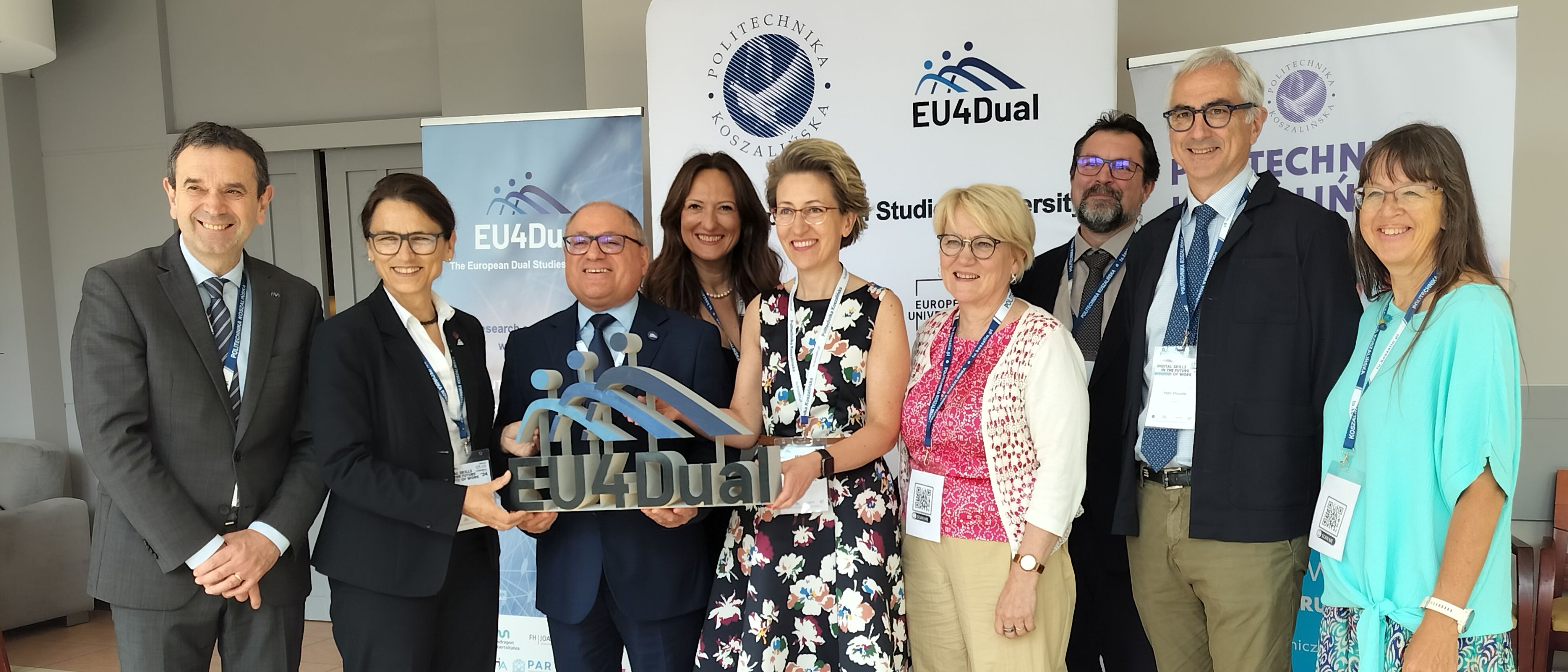
2024-06-25 15:14
During meetings held on 17th and 18th June, rectors from the 9 EU4Dual universities met in Koszalin and were updated on developments linked to the ongoing development of the EU4Dual Alliance.
During meetings held on 17th and 18th June, rectors from the 9 EU4Dual universities met in Koszalin and were updated on developments linked to the ongoing development of the EU4Dual Alliance.
They also adopted an internationalisation strategy based around the offer of trans-national learning and exchange opportunities via multi-lingual offerings including micro-credentials, work-based learning mobilities, staff mobilities, short mobilities and joint degrees.
Announcing the Common Dual Model for Higher Education
The rector’s council announces the adoption of the common dual model for higher education, a vision of education that is characterised by:
- anchoring the provision of dual HE into the policies and strategies of higher education institutions;
- practical learning taking place in the world of work, which makes up a minimum share of 20% of ECTS awarded in the course for dual masters;
- close alignment of theory and practice, assured by validating the suitability of partners from the world of work before initiating work-placement agreements;
- work-placements which are governed by bi- or tri-lateral agreements between the higher education institution, world of work partner and student;
- this practical learning, is governed by a curriculum which defines skills and competences to be achieved during the work-placement;
- recognition of learning outcomes achieved in the world of work by the HE Institutions;
- integration of practical phases in the world of work into institutional quality management systems.
Up until now, dual studies has always existed as a characteristic of specific national systems, or of specific institutional models of provision. The agreement of the Common Dual Model for Higher Education represents the first time a coordinated approach towards dual education is taken in an international context and applied at programme level – conceivably allowing any higher education programme in Europe to adopt the dual approach.
Adopting the Common Dual Model for Higher Education
Each of the 9 members of the EU4Dual alliance has presented plans to expand their provision of education that meets the criteria of this model, through:
- adaptation of existing programmes to follow the common model;
- the launch of ten new dual programmes within our institutions;
- the launch of six new, first-of-their-kind, European dual joint programmes.
By putting the Common Dual Model for Higher Education at the heart of our institutional strategies, the EU4Dual Alliance has made a major step in its objective of becoming the largest integrated Dual-Education institution in the world.
Expanding the Common Dual Model for Higher Education
Rectors have also approved plans to promote the wider adoption of the model and expand the reach of EU4Dual’s activities. The consortium plans, until the end of the year, to launch a certification programme for Dual Education, accompanied by implementation guidelines, consultancy and tutor training programmes. These will allow any institution to certify its’ learning offer against the Common Dual Model. As part of the institution’s efforts towards expanding dual education, the rectors have agreed to open up a range of new collaborating opportunities with the alliance:
- up to 6 associated partners will be invited to associate with the alliance - these partners will have the opportunity to participate in joint mobility, study and research programmes; around 20 partners globally will be supported in developing and strengthening their dual education systems, through participation in institutional transformation activities supported by the certification scheme;
- additional researchers, institutional leaders and decision makers will be invited to
- participate in our network events and share practice in particular via our annual conference on dual studies and its linked journal.
The EU4Dual certification programme will award a global quality label indicating that programmes have achieved excellence in their implementation of work-integrated Higher Education. In the coming year, many of these activities will be transferred under the umbrella of a distinct legal entity, controlled by the members of the alliance, which will be tasked with promoting the Common Dual Model for Higher Education in Europe and beyond, on a global scale.
